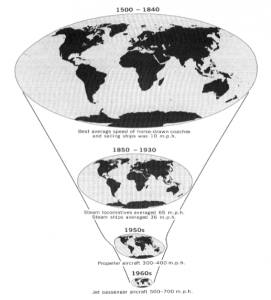As someone who thought they would dislike Geography as a university class, I have been quite pleasantly surprised by the content of GEOG 122: Geography, Modernity, and Globalization. In our program stream of Globalization, Power, and Society, I am always amazed by the seemingly endless angles, areas of study, and approaches that can be used to discuss what appears to be one issue (and usually turns out to be a series of interconnected ones). Geography has been an unexpected (for me, at least) mix of history, economics, politics, viewed through a lens rather similar to the sociological imagination that we learned to employ last semester in SOCI 102. Of course, these are used in the course to examine and explain how geography—both space and place—has influenced the process of globalization and the resulting reality of modern life.

What has hit me most is how the story of globalization is, in so many different ways, the story of overlapping counternarratives; the story of purposeful development of cultural memory and cultural forgetting. The greatest counternarrative idea that we have focussed in on is “defetishizing the commodity”, or in other words, trying to constantly think about the commodity chain of whatever it is that we interact with, and all the people it took to get that thing to us. Our personal dominant narrative is what we see around us: yet there are thousands in every instance that have other stories to tell about how we got here. Using the Irish to create buffer social control stratum against black slaves in the invention of a racial worldview to encourage the Irish to forget all they had in common with slaves is a clear example of cultural memory and forgetting.The list goes on and on. There is no one version of it all, the way we view history did not happen by accident. It has been created, and there is so much to dive into, and if, like me, you can’t access that from a classic historical approach, literary techniques and mindset can get you there.
I have always found fiction (or narrative nonfiction) the most accessible way to learn history, as do many others. Having read and loved, both in classes and on my own, many historical novels, as I get older I am able to appreciate and empathize more with generally learning history, as well as current events, just through knowing that regardless, equivalents of those powerful stories do exist, out in the real world. I believe humans naturally have a hard time with large scale empathy, but having it proven and forced upon us through story makes people better.
While here in ASTU we examine big issues by looking at and picking apart individual narratives and connecting them to each other, never straying far from literature and relying on story, Geography is coming to be the opposite. We have a huge bigger picture we are explicitly trying to understand, and getting vignettes of counternarratives helps us do that. Even brief, mostly implied stories really demonstrate the complexity of the world of trade and pursuit of capital that we live in. ASTU’s insistence on connections has changed how I look at this GEOG 122 compared to how I would have if I’d taken it in September.
Hey Jaqi, great post ! I really loved one line in particular – “What has hit me most is how the story of globalization is, in so many different ways, the story of overlapping counternarratives;” This hit me hard. I think its a really interesting analysis to show that history is often told from one perspective, or at the very least TAUGHT from one perspective, and yet in reality , as we are learning now when discussing globalization, there are many, many sides to the same story. Learning in ASTU about counternarratives contributes to this exact point, and in historical examples like 9/11, we often only hear one historical narrative, and ASTU has been an opportunity to explore more of that. Thanks so much for sharing, I really enjoyed reading !
Thank you! -zoe
I find it interesting that you like learning history through narrative stories, because I am the opposite. I prefer to learn history (most things, really) through a straight telling of events, their causes, and their effects. I never read narrative books with historical settings with any thought to actually learning history from them, it seems like a lot more writing is needed to convey the same information. I don’t mind when history is taught as a narrative though, I just never want to have point of view characters or anything like that that a novel would have. I’ve been liking the way history is taught in Geo, or at least Barnes’ lectures.
– Andrei
That’s really interesting Andrei! For me narratives give me reason to care and feel more connected to the realities of history without getting lost in endless lists of numbers, places, and names, and not get bored and overwhelmed. But I definitely understand that if you are just trying to get the facts overall rather than from just one or a few narrators point of view how a classic history class really fits that style.
Hi, Jaqi! I liked your post of describing the relationship of how other courses like SOCI 102 is between Geography and what this course is by itself. I totally agree the course of Geography is a mixture of all social science courses at this point. I am glad you have used Marita Sturken’s work when describing about the course. It is a part of memory forgetting for colonizers to brought slaves from Africa, let them forget their original identity and sent them to North America. It’s glad to know you have know this much of concept since you entered UBC. Good analysis of our Geography course and very matured way of talking about history.